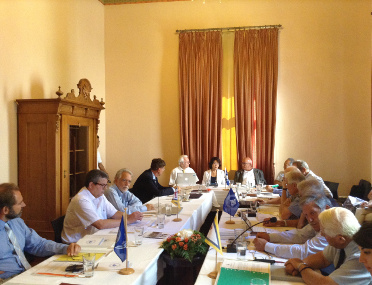Speech at the Scientific Council of the International Centre of Maritime Research and Tradition, Maria Tsakos Foundation

Commissioner Damanaki visited the island of Chios and participated in the Scientific Council of the International Centre of Maritime Research and Tradition, Maria Tsakos Foundation on Thursday September 11th. Read below Commissioner's speech on the potential of the Blue Growth strategy and the achievements of the reform of the Common Fisheries Policy.

Chios 11 September 2014
Dear Captain,
Dear friends and participants at the Scientific Council of the International Centre of Maritime Research and Tradition, Maria Tsakos Foundation,
Ladies and gentlemen,
It is with great pleasure that I am here today on the island of Chios, the island whose name travelled with the songs of many sailors and captains and made Greece and its culture known in all corners of the world. It is also with honour that I stand here amongst such distinct individuals of the Greek and international shipping. I would like to warmly thank the Maria Tsakos International Foundation and personally Captain Tsakos for his invitation and the opportunity that he gives me to address such distinguished members in the international scene of shipping.
I note, with a great sense of emotion, that the Maria Tsakos Foundation is the worthy child of the Captain. In the few years that it has been in operation – since 2010 – it has managed to give impetus and concrete examples stemming from the vision and the social conscience of the memorable Maria Tsakkos. In the past four years the Foundation already holds a record for its innovative scientific and social work in naval research and science, in providing better education for the naval world, in maintaining the cultural heritage of Chios and its rare nautical tradition. I am particularly proud that the Foundation managed to deservedly win, under tough and challenging competition, two programmes in the framework of the Operational Programme for Fisheries, managed by the services I supervise. I am referring to the research programme that the Foundation is currently preparing jointly with ELKETHE and to the one for the training of Fishers, which starts immediately. For the first time the programme will be carried out in Greece with international partnerships with countries in and out of the European Union such as Spain, Ireland, Malta and Turkey.
As you know I am coming to the end of my term as European Commissioner for Maritime Affairs and Fisheries – a term that coincided with the worst years of the economic crisis.
To me, the crisis made my work even more important. It meant that whatever good I did for fishermen or maritime workers would not just influence a delta in their income, but could even determine whether they had an income at all.
So I got to work. It was clear to me that we had to tap into the economic potential of our seas without letting sustainability, both environmental and social, out of sight. We had to let go of old models and go for new and long-lasting solutions, in fisheries as in maritime policy.
Today obtaining energy from wind, tides and waves is within reach, as is ocean harvesting for pharmaceuticals and cosmetics. But for these solutions to take shape we had to prepare the ground.
So we launched our Blue Growth strategy, which allows us to create the right conditions for growth and focus on the sectors that carry the greatest economic potential. The maritime sector employs around 5.4 million workers in Europe. It provides a total gross value added of approximately EUR 500 billion. By creating the right conditions, we estimate that by 2020 the employment rate in this sector will have been increased up to 7 million jobs and the added value up to around € 600 billion.
We focus on the 5 most promising sectors like for example Blue energy where scientific research and innovation is a key component. I am referring to power generation not only from wind turbine, but also from less exploited forms, such as tides, waves and groundwater etc. It is a technology that in the future will be an important element in the EU's electricity mix and that can create new, high-quality jobs. Conservative estimates show that at least 40,000 jobs could be created by 2035. And many of these jobs will be created in the coastal areas which are most affected by high unemployment.
For the Blue economy to prosper we need to focus on clean, safe and secure seas. First, to properly manage the diverse activities that can take place at sea I created the first pan-European rules for maritime space. This will reduce prospecting costs for operators, improve certainty for business and mitigate environmental impacts. We are also making the maritime environment more secure; in the future surveillance authorities will share information for a better overview of what goes on at sea and will share assets for better real-time response.
At the same time, we work to improve our scientific knowledge of the seas and oceans, its resources, sea bed geography and on new maritime technologies. We fund research, linking it with industry and supporting smart and innovative enterprises. The new Horizon 2020 funding programme includes a strong focus on Blue Growth. For the first two years alone, Horizon 2020 could feed a substantial amount of 275 million euro into the blue economy.
This money could feed into research for sectors like for example blue biotechnology and sea-bed mining. Blue biotechnology is a highly promising and innovative sector of maritime economy. The current global turnover of the sector is below 1 billion, but it is expected to multiply in the near future. The demand will relate to industries such as cosmetics, personal care products, new medicines and foods, and biomaterials. The development of this sector will produce opportunities for high expertise employment.
Blue growth also needs regional cooperation and ideas.
Taking maritime tourism for example, another Blue growth sector that is also of particular interest to our country. Demand is changing and people want more than a sun lounger these days. This is the time to invest in smart specialization and niche markets. For example, maritime heritage tourism is prospering in Denmark. Nautical tourism is growing steadily as the luxury yacht segment grew by some 228% between 1998 and 2008. Diving has extended the season in many resorts.
The EU is there to help local actors to seize these opportunities to stimulate growth and jobs. I created a new Strategy to give maritime tourism a precise European Action Plan with specific actions and involvement of public and private sector.
Ladies and Gentlemen,
What is also important during my mandate is the Common European Fisheries Policy reform. We reformed fishing with a total U-turn in every respect. Take a look at the graph and you understand that we were steering right into a disaster. When I arrived I found only 5 stocks fished sustainably. Thanks to the reform today we are at 27 – and next year we can have 30. In the North East Atlantic for example we halved the number of overfished stocks from around 80% when I took office to around 40% now. Our decisions are now based on science and not on short-sighted economic considerations. And for the first time ever we have a legal obligation to fish all stocks sustainable by 2020 at the latest. And, ladies and gentlemen, I don’t have to explain to you how important healthy fish stocks are for the wellbeing of fishermen and their families. Healthy stocks produce more so fishermen can land more fish - and they can spend less time and fuel to do so.
When I arrived in Brussels 1,7 million tons of fish – the same amount eaten in Belgium every year – where thrown overboard every year. By 2019 we will no longer see pictures like these, because we stop throwing away fish and instead use it as food, feed or raw material.
I am also proud that we put an end to the gruesome practice of shark finning.
And internationally I have done the same, we have been pushing the sustainability agenda with all our partners; when we fish outside the EU, we make sure it is with no detriment to local populations or fish stocks. I set a high bar and thanks to this we helped recover Bluefin tuna. Our strict course of action against illegal fishing has led to banning imports from a number of countries.
Another key aspect is the fish’s market value. Thanks to our reform our fishermen can use new labelling for fresh and locally caught fish or for fish that is caught with an environmentally-friendly method. This way they can attract higher market prices. We also help them increase the market value of their product by financing new processing and marketing techniques.
I have fought hard for a new Fund and today we finance training for young fishermen as well as life-long learning. We compensate fishermen for protecting and restoring marine biodiversity. We finance direct marketing to sell fresh fish directly to restaurants and hotels. Fishermen can also receive financial help for business advisory services: for example if they want to test if new products or techniques are economically interesting. To encourage science we fund partnerships between scientists and fishermen. And we fund any project that improves welfare and working conditions for fishermen on board.
Before, the money used to go into vessels, today the money goes to people instead as you see with the measures I just mentioned and because we finance sustainable fishing in the EU. This is six and a half billion euro that will go to fishermen, maritime workers, and their families.
Maritime workers too, because this logic does not apply only to fisheries.
Like I said, we have been laying the conditions for sustainable fisheries and for growth, innovation and economic diversification across the maritime spectrum. What we need now is for EU countries to do their bit. We also need private initiative, especially when it comes to the family-run business, the young start-up, the local projects.
The Commission encourages such bottom-up initiatives. They create jobs and improve the quality of life for the people of our islands – and this is where your Foundation comes in.
What we need is for private investors to be engaged. Your foundation can stimulate further thinking on how we can channel finance towards sustainable exploitation. We need to join forces for an objective that is not entirely simple: letting the maritime economy prosper and help us out of the recession, but at the same time letting that growth be smart and fair to the planet.
Thank you.


